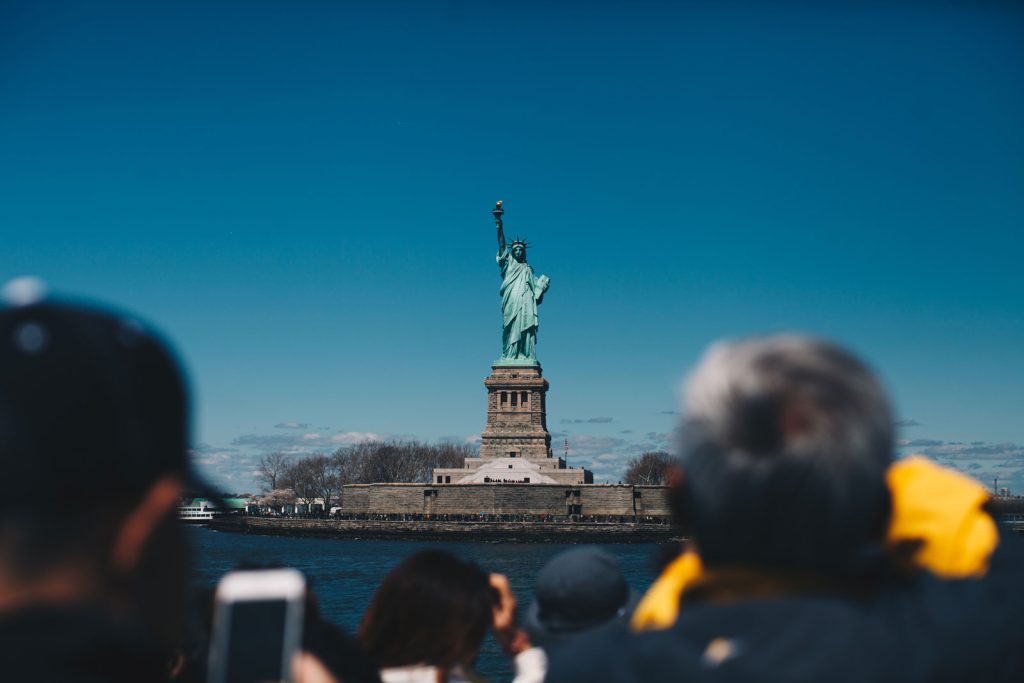Give me your tired, your poor,
Your huddled masses yearning to breathe free . . .
— From “The New Colossus” by poet Emma Lazarus, inscribed on the Statue of Liberty
At the same time the news was showing festive celebrations on July 4 this year, it was broadcasting reports about the worsening humanitarian crisis at some of the migrant detention centers along the United States border with Mexico. Some commentators and interviewees were expressing the view that if the detained migrants were unhappy with the reportedly unacceptable conditions at the centers, then they should go back to where they came from, or not come at all. Those reports saddened me and seemed to contradict the welcoming message inscribed on the bronze plaque on the Statue of Liberty’s pedestal. It made me wonder, on a very personal level, what it means to be an American today. As a nation, do we still hold close to our hearts some of the basic tenets expressed in the Declaration of Independence, the Constitution, and the famous poem by Emma Lazarus? Do we continue to believe that everyone is created equal, with the right to life, liberty, and the pursuit of happiness?
Do we take our democracy and the five basic freedoms protected by the First Amendment— freedom of religion, freedom of speech, freedom of the press, freedom of assembly, and freedom to petition the government—for granted? Have we forgotten what we represent to the rest of the world, and more importantly, to ourselves?
To me, there are many similarities between being an American and being a Buddhist. Both call upon us to take responsibility for our thoughts, our speech, and our actions. Being an American or a Buddhist means treating everyone equally, with respect and understanding. It means being inclusive and welcoming. Ideally, it means being able to see one’s own self in the conditions of all other human beings, and having compassion for their suffering. All of these principles and values help me to transcend the simple and foolish mind that I have, the one that discriminates, the one that suggests why should I care. As a Pure Land Buddhist, I practice by entrusting myself to Amida Buddha’s vow of unconditional salvation. One of the basic aspects of this vow is that all of us who are seeking clarity in life have the ability to change and to work toward achieving our highest potential. We do this by seeking refuge in the Buddha, the dharma (the teachings), and the sangha (our community). As I awaken to the vow, I begin to realize my shortcomings, my lack of wisdom and compassion, and the universal suffering of all beings.
Related: Buddhists protest the detention of migrant children at a former Japanese internment camp
The whole point of Buddhism is to awaken the sleeping mind, allowing us to realize that our existence is not centered around ourselves, and to understand and accept our deep connections and interdependence with all other beings and things. When I suffer, others suffer, and when others suffer, such as individuals seeking refuge, then I suffer as well.
We need to wake up to our own roles and responsibilities and thoughtfully to reflect on how for every action, there is a consequence.
Recently, some friends and I visited the Smithsonian National Museum of the American Indian located in the old Customs House down in Bowling Green park by the New York Harbor. On the cover of one of their brochures was a photograph of Cup’ik Eskimo doll maker Rosalie Paniyak’s 1987 soft sculpture of the Statue of Liberty, which was on display in an exhibit titled “My Love, Miss Liberty.” It reminded me that, as we contemplate what it means to be an American today, we must be cognizant of how America and one of its most beloved symbols, the Statue of Liberty, belong to all of us. We need to recognize that “We the People” refers to all peoples and all generations of Americans, past, present, and future.
The Statue of Liberty, originally named the “Statue of Liberty Enlightening the World” (Statue de la Liberté Éclairant le Monde), with her glowing and welcoming torch is a universal symbol of freedom that we celebrate with pride every Fourth of July. We must always remember not to take that freedom for granted, and to be mindful of the sacrifices and struggles of those seeking opportunity in America.
In Jodo Shinshu (Pure Land Buddhism), Amida Buddha’s unhindered light is always illuminating us, embracing and comforting us in its warmth. This light awakens me to my own foolishness, enabling me to perceive the suffering of others. How grateful I am that Amida Buddha—who understands the sufferings of all beings, in particular the ones who need it the most, and who would never forsake me or shut doors leading to hope to anyone—is in my life.
Namo Amida Butsu.
Thank you for subscribing to Tricycle! As a nonprofit, we depend on readers like you to keep Buddhist teachings and practices widely available.
